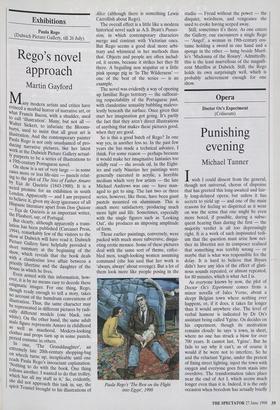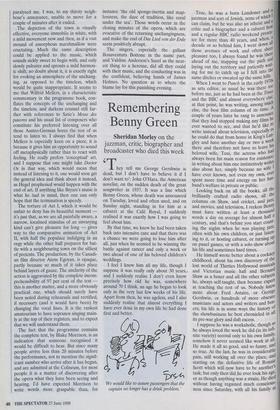Opera
Doctor Ox's Experiment (Coliseum)
Punishing evening
Michael Tanner
Iwish I could dissent from the general, though not universal, chorus of dispraise that has greeted this long-awaited and fair- ly long-delayed opera; but unless it has secrets to yield up — and one of the main reasons for feeling so dispirited as it went on was the sense that one might be even more bored, if possible, during a subse- quent hearing than during the first — the majority verdict is all too depressingly right. It is a work of such inspissated tedi- um that the question must arise how nei- ther its librettist nor its composer realised that something was terribly wrong — or maybe that is what was responsible for the delay. It is hard to believe that Bryars didn't have any idea of the effect of gluti- nous sounds repeated, or almost repeated, for 80 minutes, which is what Act I is.
As everyone knows by now, the plot of Doctor Ox's Experiment comes from a minor novella of Jules Verne, about a sleepy Belgian town where nothing ever happens, or, if it does, it takes far longer than it would anywhere else. The level of verbal humour is indicated by Dr Ox's assistant being called Ygene. Ox decides on his experiment, though its motivation remains cloudy: he says 'a town, in short, where no one has struck a blow for over 700 years. It cannot last, Ygene'. But he fails to say why it can't, as of course it would if he were not to interfere. So he and the reluctant Ygene, under the pretext of fixing street lighting, inject the town with oxygen and everyone goes from stasis into overdrive. The transformation takes place near the end of Act I, which seems much longer even than it is. Indeed, it is the only occasion when boredom has actually briefly paralysed me. I was, to my thirsty neigh- bour's annoyance, unable to move for a couple of minutes after it ended.
The depiction of the town is visually effective, everyone immobile in white, with a mild movement now and then, as if a vast mound of amorphous marshmallow were eructating. Much the same description could be applied to the music, which sounds sickly sweet to begin with, and only slowly pulsates and sprouts a mild harmon- ic shift; no doubt about it, it is exactly right for evoking an atmosphere of the unchang- ing, as opposed to the timeless, which would be quite inappropriate. It seems to me that Wilfrid Mellers, in a characteristic commentary in the programme book, con- flates the concepts of the unchanging and the timeless, and darkens counsel still fur- ther with references to Satie's Messe des pauvres and his usual list of composers who constitute his preferred listening over all those Austro-German bores the rest of us tend to listen to. I always find that when Mellers is especially keen on a piece, it is because it gives him an opportunity to sound off metaphysically rather than to react with feeling. He really prefers 'conceptual' art, and I suppose that one might take Doctor Ox in that way, which would mean that instead of listening to it, one would soon get the general idea and think about it instead, as Hegel prophesied would happen with the end of art. If anything like Bryars's music is what he had in mind, then one can only hope that the termination is speedy.
The torture of Act I, which it would be unfair to deny has its beautiful moment it's just that, as we are all painfully aware, a narrow, localised stimulus of an unvarying kind can't give pleasure for long — gives way to the comparative animation of Act II, with half the populace indulging in an orgy while the other half prepares for bat- tle with a neighbouring town on the silliest of pretexts. The production, by the Canadi- an film director Atom Egoyan, is opaque, partly because so much of it takes place behind layers of gauze. The unclarity of the action is aggravated by the complete incom- prehensibility of 97 per cent of the text this is another matter, and a more obviously practical one, which should surely have been noted during rehearsals and rectified, if necessary (and it would have been) by changing the vocal lines. It is the rankest amateurism to have sopranos singing main- ly at the top of their registers, and to expect that we will understand them.
The fact that the programme contains the complete text, by Blake Morrison, is an indication that someone recognised it would be difficult to hear. But since many people arrive less than 20 minutes before the performance, not to mention the signif- icant number who arrive after it has begun, and are admitted at the Coliseum, for most people it is a matter of discovering after the opera what they have been seeing and hearing. I'd have expected Morrison to write words more graspable than, for instance 'the old sponge-inertia and map- lessness, the daze of tradition, like coral under the sea'. Those words occur in the closing minutes of the opera, which are evocative of the returning unchangingness, and make the end of Das Lied von der Erde seem positively abrupt.
The singers, especially the gallant Bonaventura Bottone in the name part, and Valdine Anderson's Suzel as the near- est thing to a heroine, did all they could with their music, and the conducting was in the confident, believing hands of James Holmes. No question as to where the blame lay for this punishing evening.



























































 Previous page
Previous page